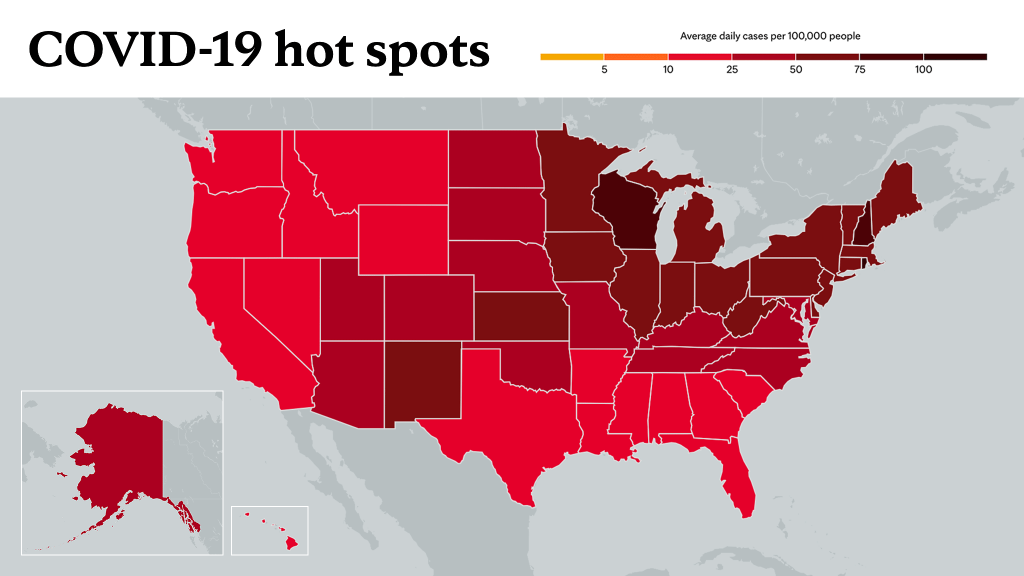-
Mayo Clinic Health System reaches COVID-19 therapy milestone

ROCHESTER, Minn. — Increasing access to high-quality health care and providing innovative, evidence-based care solutions to the communities it serves is a priority for Mayo Clinic Health System, even in the midst of an enduring global pandemic encompassing two years. One innovative therapeutic advancement used to prevent severe disease and death due to COVID-19 is called monoclonal antibody therapy.
Mayo Clinic has one of the most robust monoclonal antibody programs in the country, and the program has strongly contributed to the state of Minnesota's public health and ability to confront the COVID-19 pandemic. This week marks a milestone, as Mayo Clinic Health System infused its 10,000th patient with monoclonal antibodies. To date, 20,000 infusions have been performed across all Mayo Clinic locations including Arizona and Florida.
"We are proud to be at the forefront of transforming care and providing monoclonal antibody treatments to our patients. Most of them reside in our more rural communities, some with populations as small as 3,500 residents," says Prathibha Varkey, M.B.B.S., president of Mayo Clinic Health System. "We know this lifesaving treatment has reduced the number of patients requiring hospitalization for severe disease and ultimately has helped improve patient outcomes. This is especially relevant, as Mayo Clinic hospitals have been operating at or near capacity for months. In recent weeks, we have seen increases in the number of patients with COVID-19 needing care, and that number is expected to remain elevated."
Monoclonal antibodies are drugs that consist of one (mono-) neutralizing antibody copied (cloned) in a lab that helps to decrease the amount of virus circulating in the body. Patients as young as 12 who meet criteria and are considered high-risk for developing severe disease are eligible to receive monoclonal antibody therapy. The therapy is administered by IV, which can be done on an outpatient basis.
Earlier this year, Mayo Clinic researchers concluded that, based on real-world data, monoclonal antibodies help patients avoid hospitalization when administered early on before the disease progresses. Additional Mayo Clinic research has shown up to 70% reduction in hospitalization.
Monoclonal antibody infusions are available at Mayo Clinic in Rochester and these Mayo Clinic Health System locations:
- Albert Lea, Minnesota.
- Austin, Minnesota.
- Barron, Wisconsin.
- Bloomer, Wisconsin.
- Cannon Falls, Minnesota.
- Eau Claire, Wisconsin.
- Fairmont, Minnesota.
- La Crosse, Wisconsin.
- Mankato, Minnesota.
- New Prague, Minnesota.
"Our staff quickly mobilized to provide monoclonal antibody therapy for patients with COVID-19 in Northwest Wisconsin, and this has helped many people avoid serious illness and hospitalization," says Richard Helmers, M.D., regional vice president of Mayo Clinic Health System in Northwest Wisconsin. "We are proud of the innovative work our staff has done to provide lifesaving care throughout this pandemic."
Mayo Clinic Health System serves 600,000 patients in its geographic service areas. Approximately 66% of Mayo Clinic Health System patients live in rural communities in Iowa, Minnesota and Wisconsin.
# # #
Mayo Clinic Health System consists of clinics, hospitals and other facilities that serve the health care needs of people in Iowa, Minnesota and Wisconsin. The community-based providers, paired with the resources and expertise of Mayo Clinic, enable patients in the region to receive highest-quality physical and virtual health care close to home.
For the safety of its patients, staff and visitors, Mayo Clinic has strict masking policies in place. Anyone shown without a mask was either recorded prior to COVID-19 or recorded in a nonpatient care area where social distancing and other safety protocols were followed.
Information in this post was accurate at the time of its posting. Due to the fluid nature of the COVID-19 pandemic, scientific understanding, along with guidelines and recommendations, may have changed since the original publication date.
For more information and all your COVID-19 coverage, go to the Mayo Clinic News Network and mayoclinic.org.
Learn more about tracking COVID-19 and COVID-19 trends.








